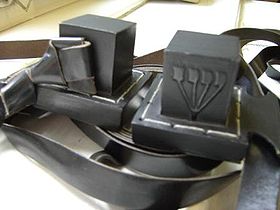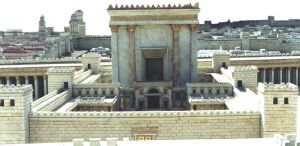 Ekev
Ekev
“This shall be the reward when you listen to these ordinances…”
Whereas last week’s Sedra, Va’etchanan, starts off with rebuke, Ekev starts off talking about the reward for keeping the mitzvot. Strangely, the first verse starts off in the plural, and the rest of the passage is in the singular. This seems to suggest that by keeping the mitzvot, the Jewish people will be regarded as a single entity. This reward is pertinent to one who keeps both major and minor commandments.
The blessings mentioned here are some of the most beautiful in the Torah:
“[Hashem] will bless the fruit of the womb and the fat of the land” – this shows us that we should not hold back from having children because of lack of money, for Hashem will surely provide the parents with their upkeep once the child is born.
“ You will be the blessed of all peoples” – all the nations will see that Israel is blessed.
“Hashem will remove from you every illness” – serious or otherwise.
We are also told not to fear the battle with the seven nations of Canaan, as Hashem is with us. Despite all this, though, Israel had three worries at this time:
1. They feared that they might continue dying on the night of every Tisha B’av
2. They were worried that they were not multiplying. There were 603,550 Jews that left Egypt, and now, forty years later, they numbered 601,730.
3. They still hadn’t inherited the Land of Israel.
These three fears were allayed when Moshe said “You shall observe [the commandment] …so that you may live and increase…and possess the Land”. You don’t have to be a genius to realise that ‘live’ refers to not dying, ‘increase’ refers to having children, and ‘possess the Land’ refers to, well, possessing the Land. During our 40 years in the desert, our worth had been proved to the Satan and the nations of the world as to our high spiritual level – thanks to our trials and tribulations.
The description of Israel that follows is an incredible one – we are told that the Land will yield everything for us, but we must “take care, lest you forget Hashem, by not observing his commandments”. From this we learn that even if, Heaven forbid, a person forgets G-d but still keeps his commandments, the light of the Torah will bring him back to the right path. But if we don’t even keep the commandments, how can we ever reach that path? Certainly not by excessively involving ourselves with worldly matters, or with an over-abundance of money. The chief worry with a rich person is that he will not lend or give his money to people who need it. What other reason are we given money for, if not to us it for acts of chesed (lovingkindness)? Certainly not to over-indulge while our poor brethren lie starving. In this unfortunate case, the rich person will not inherit the Divine Presence, which will then leave him; and thus he will forget G-d.
But whether an has money or not, he is not supposed to sit idle. Hashem tells us that He will “Bless[us] in all [we] do”, implying that we have to ‘do’ to get the blessing. Hashem even gives us the strength for our actions. All we need is a change of heart to get on the right track. And as it is coming up to Yom Kippur, it’s time for us to all think about that change of heart, that change of attitude. For a mitzva needs to be done with the correct attitude, for the Sake of Heaven.
For Heaven’s sake – let’s get to it!
Moshe then recounts how he received the Tablets of the Ten Commandments at the end of 40 days of fasting at the top of Mount Sinai. After receiving them, Hashem told him to “go quickly” to the Israelites. We are told in the Midrash that as soon as the Israelites made the golden calf, the angels attempted to harm Moshe. Hashem then opened a way for him under the Throne of Glory by which Moshe descended. From this we see the incredible danger that Moshe selflessly went through on our behalf. Indeed, Hashem wanted to destroy all the Jews and make a nation out of Moshe, but Moshe prayed fervently for us and we were saved.
During this prayer, he asked for mercy for the Jews in the merit of Abraham, Isaac and Jacob with the statement “Do not turn to the stubbornness of this people, and to its wickedness and to its sin”. This refers to all three Patriarchs:
“Stubbornness” – this is Abraham, who used stubbornness to fight idolatry.
“Wickedness” – this is Isaac, who bared his neck to the ‘wicked’ slaughtering knife.
“Sin” – this is Jacob, who suffered exile ( which is an atonement for unintentional sins).
Moshe goes on to say that he was told by Hashem to make two Tablets of the Ten Commandments. But why was he asked to make them first, before being commanded to make the Ark to put them in? The reason is that Hashem didn’t want to prolong Moshe’s suffering regarding the fate of the Jews, so Hashem was ‘eager’ to tell Moshe the good news that He had been appeased, so He told Moshe to make the Tablets immediately to give to Israel. We learn from here that we should always try to bring good news to a person promptly, so that we can make him happy as soon as possible.
Do you have good news to tell a friend? GO FOR IT – but make sure it’s not Lashon Harah!
The Tribe of Levi was appointed to carry the Ark containing the Tablets, as their dedication to G-d was shown in three ways:
1. In Egypt, they kept up the tradition of circumcision, and they didn’t serve idols.
2. When the rebels made the golden calf, they risked their lives to kill the offenders.
3. When some of the Jews turned back to return to Egypt, they chased after them and fought them – again, at great risk.
In turn, they were elevated in three ways:
1. They merited to carry the Ark.
2. They were to serve Hashem in the Temple.
3. They were given the honour of blessing the people with the Priestly Blessing in Hashem’s name, until this day.
In our generation, our aim should be to be like the Tribe of Levi in their generation -head above water in a sea of materialism and corruption. Let us not be swayed by the grain of society, that beckons us to go against our Holy Torah, but instead let us be shining examples to our fellow Jews and the gentiles. Then maybe we might merit some great honours, too!
SHABBAT SHALOM





